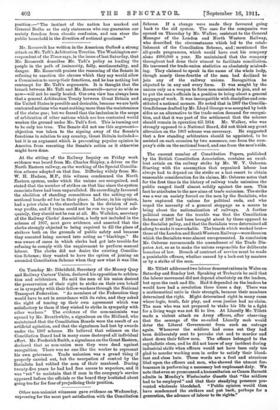Other non-unionist witnesses gave evidence on Wednesday, expressing for the
most part satisfaction with the Conciliation Scheme. If a change were made they favoured going back to the old system. The case for the companies was opened on Thursday by Mr. Walker, assistant to the General Manager of the London and North Western Railway, who described the circumstances which led to the estab- lishment of the Conciliation Scheme, and mentioned the all-grade programme, which would have cost his company alone £600,000 a year. He maintained that the company throughout had done their utmost to facilitate conciliation. He traversed the trade-union statistics as absolutely mislead-. ing. They claimed to speak in the name of the whole body, though nearly three-fourths of the men had declined to join any of the railway unions. Recognition he objected to in any and every form. It was sought by the unions only as a weapon to force non-unionists to join, and so to put the men's officials in a position to bring about a general stoppage of work. It was incompatible with discipline and con- stituted a national menace. He noted that in 1907 the Concilia- tion•Scheme drafted by Mr. Lloyd George WAS accepted by both sides as an alternative to the trade-union demand for recogni- tion, and that it was part of the settlement that the scheme should remain in operation till 1914. Mr. Walker, who was strongly opposed to a National Board, did not think any great alteration on the 1907 scheme was necessary. He suggested that a few standing arbitrators should be appointed, to be assisted on each occasion by two assessors, one from the com- pany's side on the sectional board, and one from the men's side.










































 Previous page
Previous page